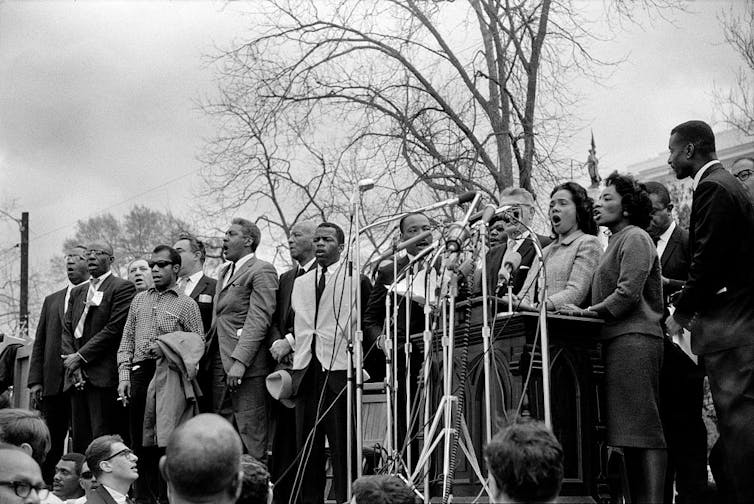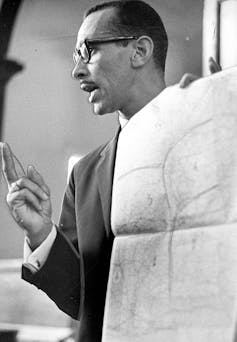How civil rights leader Wyatt Tee Walker revived hope after MLK's death
- Written by Corey D. B. Walker, Visiting Professor, University of Richmond
Four years after the assassination of Martin Luther King, Jr.[1], the novelist James Baldwin would write on the pages of Esquire[2] magazine, “Since Martin’s death, in Memphis, and that tremendous day in Atlanta, something has altered in me, something has gone away.”
Baldwin wrote about how “the act of faith” – that is, his belief that the movement would change white Americans and ultimately America – maintained him through the years of the black freedom movement, through marches and petitions and torturous setbacks.
After King’s death, Baldwin found it hard to keep that faith.
Nearly two weeks after King’s funeral, in April of 1968, King’s confidant and former strategist Wyatt Tee Walker[3] tried to renew this faith. Drawing on a tradition of black faith, Walker encouraged a grieving community to embrace hope even in the face of despair.
As a scholar of religion and American public life[4], I recognize the important lessons Walker offers for current times when America is deeply divided.
Faith in action
Black public faith has a storied place in American life.
The black church has been a place of fellowship and affirmation[5] from colonial America to modern day, empowering individuals to undertake public acts to transform politics and society.
The 19th-century National Negro Convention[6] movement, which ran from 1831 to 1864, demonstrated this black faith in action. Its leaders advocated for the abolition of slavery and full citizenship for African Americans. One activist reflected years later that the “colored conventions” were “almost as frequent as church meetings[7].”
The civil rights movement carried this faith in action forward[8]. Theologian Dwight Hopkins[9] has written how the sermons and songs of black faith empowered and sustained African Americans, even in bleak times.
These practices on Sunday morning, he noted served to “recharge the worshipers’ energy[10]” so they could deal with the “rigors and racism of ‘a cruel, cruel world’ from Monday though Saturday.”
 Civil rights and Union leaders sing ‘We Shall Overcome’ at the conclusion of the Selma to Montgomery civil rights march on March 25, 1965 in Montgomery, Alabama.
Stephen F. Somerstein/Getty Images[11]
Civil rights and Union leaders sing ‘We Shall Overcome’ at the conclusion of the Selma to Montgomery civil rights march on March 25, 1965 in Montgomery, Alabama.
Stephen F. Somerstein/Getty Images[11]
It was this faith that empowered many African Americans to maintain their faith in the possibilities of democracy while facing entrenched white opposition to their civil rights. Marches, sit-ins, demonstrations and mass meetings were all public displays of black faith.
The risk of faith
In the wake of King’s assassination, the words of his last published book, “Where Do We Go From Here? Chaos or Community[12],” reverberated throughout the nation.
Urban rebellions erupted in the wake of King’s death. With parts of over 100 cities smoldering or in ruins[13], chaos seemed a more likely future in 1968 America than community.
In a sermon called “Faith as Taking the Risk,” delivered at Princeton Theological Seminary[14], Walker sought to address a question posed by a young theologian James H. Cone[15] after King’s death: “Without King, where was the hope[16]?”
Deftly navigating the tension between hope and despair, Walker based his message on the response of the Hebrew prophet Elisha in the Book of Kings[17] who faced crisis and despair with an invading Syrian army, widespread famine and people ready to give up.
Drawing inspiration from the faith of the community, Elisha encouraged the community to keep faith in their nation.
Horizon of hope
Elisha’s example powered Walker’s message. At Princeton, Walker encouraged the black seminarians not to countenance a nostalgia for the past. In moments of deep discouragement, Walker said, distressed people tend to retreat into a romanticized past[18].
“In the jargon of the street,” Walker said, “it sounds like this: ‘Child, don’t you wish it was like it was back in the good old days… .”
“And yet,” he declared, “not by any wishing or hoping or praying or anything else can we find any day when things were better. There was no such day!”
Walker proceeded to caution his audience against maintaining the status quo. Walker proclaimed[19], “Whatever dream of life it is we envision for our children, ourselves, our community, our church, we will never bring it to our fingertips unless it begins first with some initial risk.”
For Walker, challenging the status quo was a fundamental aspect of existence.
“The elemental character of life is one that is moving and dynamic,” he said[20].
Walker closed his sermon by urging the audience to embrace hope-filled struggle. But he did not deny the desperate reality.
Instead, in the face of despair, he urged the young seminarians to take a risk of faith and build a future that has not been. For Walker, that meant “doing, trying, moving toward things which have never been tried before.”
Hope in democracy
 Wyatt Tee Walker in Montgomery, Alabama on April 3, 1962.
Afro American Newspapers/Gado/Getty Images[21]
Wyatt Tee Walker in Montgomery, Alabama on April 3, 1962.
Afro American Newspapers/Gado/Getty Images[21]
The lasting testament of black public faith is its affirmation of new possibilities during moments of deep doubt. Rather than relying on a myth of the past or upholding the status quo, Walker offered the seminarians at Princeton a new vision of a political community[22].
“What I’m saying to you,” Walker declared, “is that I have the ultimate faith that we are going to find a tranquility with justice in this nation, in this world. We must! And it is conceivable it could happen in our time.”
Many Americans are angry[23] with the state of the political system. And acts of racial bigotry[24] and religious intolerance[25] have become far too ordinary.
In such times, Wyatt Tee Walker’s words can remind people to muster hope and keep faith with the possibilities of American democracy while continuing the struggle for a just society.
[Deep knowledge, daily. Sign up for The Conversation’s newsletter[26].]
References
- ^ Martin Luther King, Jr. (kinginstitute.stanford.edu)
- ^ Esquire (www.esquire.com)
- ^ Wyatt Tee Walker (library.richmond.edu)
- ^ scholar of religion and American public life (jepson.richmond.edu)
- ^ place of fellowship and affirmation (www.pbs.org)
- ^ National Negro Convention (coloredconventions.org)
- ^ almost as frequent as church meetings (books.google.com)
- ^ carried this faith in action forward (library.richmond.edu)
- ^ Dwight Hopkins (divinity.uchicago.edu)
- ^ recharge the worshipers’ energy (www.baylorpress.com)
- ^ Stephen F. Somerstein/Getty Images (www.gettyimages.com)
- ^ Where Do We Go From Here? Chaos or Community (www.thekinglegacy.org)
- ^ 100 cities smoldering or in ruins (www.theatlantic.com)
- ^ Princeton Theological Seminary (www.ptsem.edu)
- ^ James H. Cone (utsnyc.edu)
- ^ Without King, where was the hope (www.orbisbooks.com)
- ^ Hebrew prophet Elisha in the Book of Kings (journals-sagepub-com.newman.richmond.edu)
- ^ retreat into a romanticized past (journals-sagepub-com.newman.richmond.edu)
- ^ proclaimed (journals-sagepub-com.newman.richmond.edu)
- ^ said (journals-sagepub-com.newman.richmond.edu)
- ^ Afro American Newspapers/Gado/Getty Images (www.gettyimages.com)
- ^ new vision of a political community (journals-sagepub-com.newman.richmond.edu)
- ^ Many Americans are angry (thehill.com)
- ^ racial bigotry (apnews.com)
- ^ religious intolerance (www.theatlantic.com)
- ^ Sign up for The Conversation’s newsletter (theconversation.com)
Authors: Corey D. B. Walker, Visiting Professor, University of Richmond

